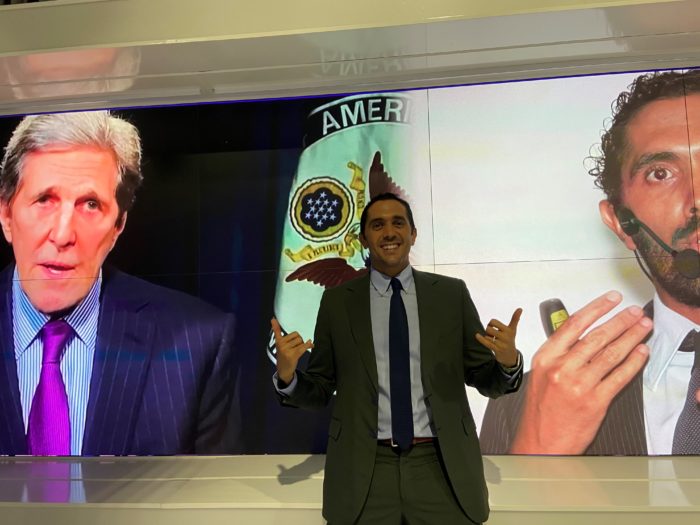
Saad Abid is an environmental activist, and 2016 participant of the U.S. Department of State International Visitor Leadership Program (IVLP) from Morocco. He received the 2021 Global Ties U.S. IVLP Alumni Decade of Social Innovation and Change Award for his work, inspiring thousands of participants to take action against climate change. We spoke with Saad about his reaction to receiving the award and why he believes in the power of citizen diplomacy.
Saad’s IVLP was organized by Meridian International Center, in coordination with Gulf Coast Diplomacy, Global Ties San Francisco, Northern Nevada International Center, and GlobalPittsburgh.
How did your International Visitor Leadership Program (IVLP) shape your work in Morocco?
Being in the United States for three weeks and learning from the best environmental organizations gave me the confidence and motivation to come back to Morocco and apply the best practices. I know that I am not alone in this struggle. Honestly, the IVLP was definitely a life-changing experience for me.
You are the founder and president of the Bahri Association. What inspired you to create the organization?
I have always been close to the ocean. I started surfing at seven years old, and after becoming a two-time Moroccan champion, I wanted to find a way to give back to the ocean. That’s when I decided to create the Bahri Association, an NGO that aims to protect the ocean, and raise awareness amongst the youth. I will always do my best to clean the beaches, even if sometimes I feel that our beach cleanups represent a small drop in the ocean.
Community involvement and youth engagement form the core of your work. Why is this important to you, and how do you encourage people to take that first step towards civic activism?
I have always been inspired by President John F. Kennedy’s inaugural speech, when he said, “Ask not what your country can do for you – ask what you can do for your country.” For me, it’s important to be a role model and an actor in your community because we can’t hope for change, or for a better life, if we sit back, relax, and watch. In soccer, you can’t be a spectator and ask the other players to score or to dribble (for you), you need to be on the pitch if you want to score a goal.
I encourage people to take their first step towards civic activism by telling them if you don’t do it with your own hands, no one will do it for you. Don’t rely on the government to make our country a better place to live. As a citizen, you are the one responsible for your own country’s future.
In your opinion, what makes citizen diplomacy so important?
It’s important because it gives you a broader image of what we need to achieve as citizens. Unfortunately, with social media and selfies, people tend to be focused on themselves. It’s Me, Myself, and I. Thanks to citizen diplomacy, the focus shifts from centralized to decentralized and you start thinking, “How I can make life better for others?”
You are very active on social media as a content creator. How does social media shape your ability to inspire people to take action against climate change / environmental degradation?
I always use social media to reach out to the younger generation and try to disconnect them from the virtual world of Instagram, filters, and selfies. My goal is to reconnect them with the real world, and with nature. I often organize beach cleanups, and visit landfills and recycling plants in order to inform the youth about the real challenges that are ahead of us.
I see many people who call themselves “influencers,” but they spend all their time selling products that have no added value to their community. I’d rather inspire, instead of influencing people, from my community.
What was the response from your community after you received the IVLP Alumni Decade of Social Innovation and Change Award and gave your speech at the Global Ties U.S. National Meeting?
I received tons of messages not only cheering me on, but also congratulating me for all the hard work we’ve done since 2010. People who are close to me know I am passionate about beach cleanups, and now that I’ve gotten international recognition for our work in Morocco, it’s really moved them. My father cried for the first time, when he saw me live on the N°1 TV channel in Morocco.
Usually, you have a lot of haters on social media, but after more than 20 articles, all in the mainstream media, I got only positive feedback, which is rare. Honestly, I am proud to represent my country, Morocco, and the African continent.
Tell us more about your upcoming civic engagement project, Saad Sees America.
I intend to travel in the United States for one month, interviewing high profile people about the importance of civic engagement. I will then take the best practices and come back to Morocco to launch a platform that will provide unique opportunities to the people that volunteer the most.
My challenge will start in Morocco with the new U.S. Consul General, who will nominate two people that I will meet with in the United States. I also want to do street interviews with American citizens, especially the youth. I hope to meet organizations, celebrities, journalists, and more.
